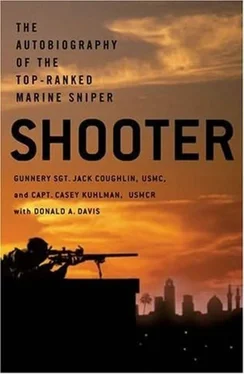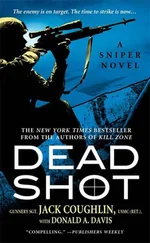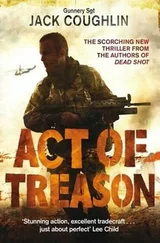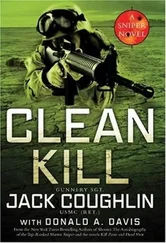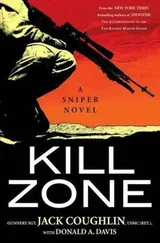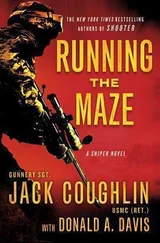The tough schools and the rugged fieldwork were followed by intense exercises and then, finally, dangerous assignments in the real world. At no point did I ever consider that I was slowly turning into a killer, but I was.
The first ten years of my career passed in a blurry whirligig of action as I moved from hot spot to hot spot, never knowing where I would land next, totally focused and energized by the magnitude of the events that unfolded around me in jungles, cities, and sandy wastes from Europe to the Philippines to Panama.
It was if I had stepped right out of college and into a war movie that never ended. Not only was I good at what I did, but I was also single, which meant that I could move out at a moment’s notice and had the extra advantage of being relatively expendable. I thought I was perfectly content, running around looking for trouble, and had no desire to get married and settle down.
But shortly after I returned from Somalia and took up new duties at 29 Palms, California, things changed one night at a club in nearby San Bernadino, when I met Kim, a pretty, intelligent blonde from Long Island, New York. She was twenty-four years old and had taken an English degree from the State University of New York at Stony Brook and then joined the Air Force. She had two stripes and I had three, so we both had the enlisted person’s unorthodox view of officers and the world. The more we talked, the more we wanted to talk, and she didn’t even blink when she learned on that first night that I was a sniper.
Suddenly, something important was shoving my job out of the way. Could I have a real life, just like everybody else? She was based at March Air Force Base outside of San Bernardino, and I was soon driving down there a couple of times a week, then every weekend. Within only six months, we decided to get married, and we eloped on October 3, 1993. Only afterward did we venture back to Massachusetts and Long Island to meet the families and throw reception parties for our hometown friends.
Back in California, we settled down in San Bernardino for a few months, but Kim quickly became pregnant, so she quit the Air Force and we moved into base housing at 29 Palms. Our first child, Cassandra, was born in July 1994, a talkative little Irish girl with light red hair, and she immediately stole my heart. Soon we bought our own place, a nice house with a swimming pool in 29 Palms, located in a rare neighborhood inhabited by few, if any, other Marine families.
It was as if I were on a voyage of discovery, and I jumped into this new personal life with both feet. My life revolved completely around my family, and even while I was working, I would look forward to going home, so there was never any boy’s night out for me. Instead of drinking beer in a bar, the big, bad sniper would lie down on the living room sofa with his baby daughter and watch television until she fell asleep, then tuck her into bed.
Kim got a job on the Marine base in finance, the same sort of thing she had done in the Air Force, and also studied for her teaching credentials. Not long afterward, she managed to convert a substitute job into a full-time teaching position at the high school that simultaneously helped her toward earning a master’s degree.
But the sniper was always in the house, too, although we both tried to keep him bottled up in a cupboard and out of sight. I believed that Kim understood how to separate Jack the husband and father from Jack the sniper. I would go away, sometimes for long periods, do what I had to do, and return home. We never, ever, discussed my work. It was not the sort of thing that husbands and wives talk about.
“Hi, honey. How was your day?”
“Oh, I killed some guys. How was your day?”
I was not being secretive by choice, but I was forbidden to discuss my work with anyone who was not directly involved in the job, even my best friends. To do so posed the risk that vital information might reach the ears of people who would think nothing of bringing vengeance down upon the ones I loved. I would not let that happen, so I kept my mouth shut. Such is life in the shadows.
If I awoke suddenly in the middle of the night with a start so violent that it shook the bed, Kim knew not to question why or what was going on in my head. She was careful not to startle me with a sudden touch. Instead, once she was sure that I was awake and knew that I was safe at home, she would gently take my quaking hands in her own and say softly, “I’ll just fix your hands.”
I continued to be away a lot, more than I wanted. Such a combination of absence and stress does not always make the heart grow fonder, so it was almost inevitable that strains developed between us. We separated for three months in 1997 and actually went so far as to file divorce papers. I knew, however, that it would be best for Cassie to grow up in a house with her mom, so Kim and I got back together.
Not long after that, our second daughter, brown-haired Ashley, was born, and I fell in love all over again with the latest chatterbox in my life. After a hard day in the field, I would go home and play daddy, wading through a crowd of plastic dolls on the floor and watching so many cartoons on television that I developed a genuine hatred for that purple dinosaur, Barney.
Things stabilized between Kim and me, but we knew that we were going to have to be very careful in the future.
Thou Shalt Kill
The manual says, “The primary mission of a scout/sniper in combat is to support combat operations by delivering long-range precision fire on selected targets from concealed positions. The scout/sniper also has a secondary mission of gathering information for intelligence purposes.”
I consider that definition to be a waste of a sniper’s unique skills. It is anchored in the way wars were fought in ancient times and confines us to working in much the same ways as the sharpshooters did along the trench lines of World War I, hiding in the mud and waiting for an enemy soldier to appear. We can all do it.
A few years ago, I was part of a Marine Recon Team raid on an enemy encampment. My spotter and I crept into the area, found the bad guys, established a hide-a camouflaged position deep in a burned-out room on the third story of a building-and hunkered down there for about twenty-four hours, feeding quiet radio reports on every move they made. During the night, the rest of our Recon Team moved up while I covered them from about eight hundred yards away. It was straight out of the book, about supporting a military operation by delivering precision fire from a distance, and would require no fancy shooting on my part.
I locked my scope on a guard who was carrying a light machine gun, and when the attack signal was given and the Recon Team rose like shadows in the new dawn, I fired one shot, knocking the guard backward, down, and dead. Our guys overwhelmed the camp in a savage assault, and I took out another target, then lined up on a third soldier who was carrying a rocket-propelled grenade and trying to flank our team. I brought him down, too. The raid took no more than a couple of minutes, and a dozen enemy soldiers lay dead. From a distance of eight football fields away, I had killed three of them. It was a perfect mission, since we accomplished our assignment and sustained no casualties. But when I emerged from the hide to shake out my cramped muscles, I once again had the gnawing feeling that I could have done much more than just lie there and wait.
In my opinion, the quick pace of war today has rendered the traditional role of the sniper obsolete. In a raid of this sort, the tactic still worked well, but modern battlefields are changing, and long-distance precision shooting means little if tanks and armored personnel carriers filled with infantrymen have already moved the fight five miles beyond you.
Читать дальше
